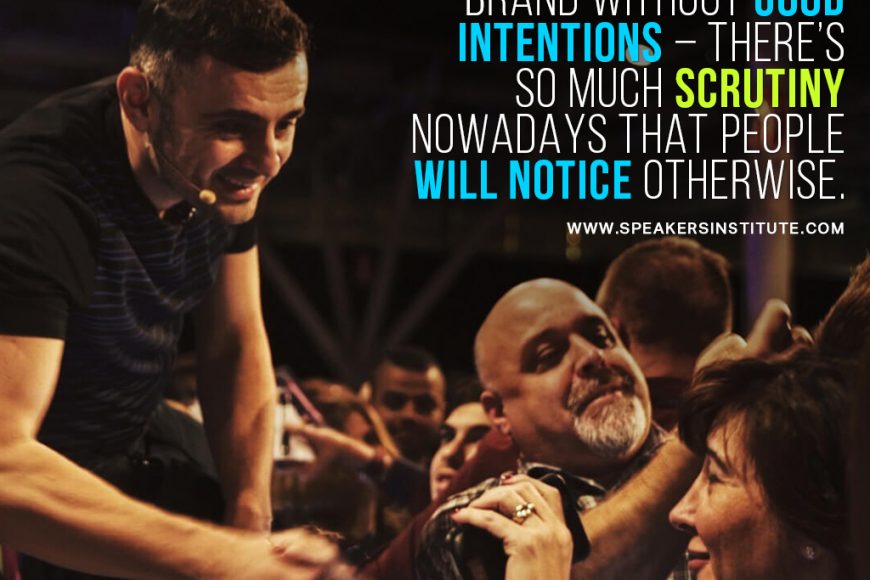
Five Tips for Building a Personal Brand (From Simon Sinek, Gary V, and More)
Why should people connect with your message? If you can’t answer that, you need help building your personal brand. Follow these tips from the experts.

What does a personal brand mean for a speaker?
It’s an important question to ask yourself, especially when building a business. You may think that your job begins when you set foot on stage and ends when you walk off. But in truth, that’s only the beginning.
Your job as a speaker is to use your story to engage an audience. You want people to connect with you and become followers.
To do that, you need a powerful personal brand.
Your personal brand is an extension of the messages that you deliver on stage. It’s through your brand that you can continue to influence others when you’re not speaking.
And it’s your brand that keeps people interested in you as well as your message.
Don’t make the mistake of ignoring your personal brand. Many influencers feel that branding dilutes their message.
That’s not the case.
Personal branding helps you to grab the attention of more people. It helps you to spread your message and ensures people really care about what you say.
So, how do you build your personal brand?
Start with these tips from the experts who have millions of people engaging with their brands.

Simon Sinek – Start With “Why”
You may remember Simon Sinek from a clip that did the rounds on social media a couple of years back. In it, he talks about the challenges that businesses must confront when dealing with younger employees.
That’s his brand.
Sinek has very strong opinions on what business owners need to do to improve. His whole purpose is to get those opinions across to ensure better management.
That’s Sinek’s “Why”. And he says that it’s crucial that you have a “Why” if you want to build a personal brand:
“From leaders like Martin Luther King to companies like Apple, regardless of their size or industry, they all start with ‘Why’.”
He then goes on to explain what your “Why” is:
“By ‘Why’ I don’t mean to make money, that’s always a result. By ‘Why’, I mean what’s your purpose, cause or belief? Why does your company exist? Why did you get out of bed this morning? And why should anyone care?”
Everybody wants to make money. That’s a given. But if it’s your only motivator, you’ll struggle to build a personal brand.
You need to have a purpose to encourage people to care about you. If you’re only focused on money, there’s nothing to separate you from the crowd. But if you have a cause that you care about, people are more likely to align themselves with you.
And that means they’re more likely to share your message and get it to a larger audience.
Ultimately, this benefits your business.
Sit back and ask yourself why you want to become a speaker. Do you want to inspire others to make a positive change? Do you want to help people avoid the mistakes you made in your life or career?
Whatever the case may be, it’s your “Why” that drives you and gets people to connect with you.
Gary V – Good Intent Matters
Gary V has enjoyed an interesting journey as an influencer. Having built a business out of his enthusiasm for wine, he’s now held up as a personal branding guru by many.
It’s easy to see why. Millions of people watch his videos and follow his advice. He’s a successful speaker and entrepreneur who’s built a business based on his personality.
He says that the key to personal branding is to always have good intentions.
Gary highlights that the internet makes so much of your life and business visible to the public. You will make mistakes along the way and people will see them. To maintain your brand, it’s crucial that every action that you take has good intent behind it.
As Gary puts it:
“In an environment like this, people who have good intent are going to win. And people who come from a bad place are going to lose. The internet is going to expose all of us, so think long and hard about what your intentions are.”
Gary isn’t attempting to paint the internet as a bogeyman here. Instead, he’s saying that you have to build a consistent brand on multiple fronts. And you have to do it with the intention of providing something of value to your audience.
That comes back to Sinek’s point about finding your “Why”. Once you know your “Why”, every action you take should have the intention of fulfilling that purpose.
Oprah Winfrey – Love What You Do
An audience can sense when you’re not authentic. They can tell when you’re just saying things in an effort to part them with their cash.
And they’ll stop listening to you once they tag you as inauthentic.
How do you approach the authenticity conundrum when building your personal brand?
Media mogul Oprah Winfrey says that it’s all about passion. Winfrey has built an amazing brand thanks to her long-running talk show and constant dedication to her “Why”.
But it’s the love that she brings to her work that sets her apart. She says:
“Your fullest, highest expression comes, obviously, when you do what you love.”
If you don’t love your message and the business you’re building around it, you’ll struggle to build a personal brand. People won’t want to engage with you as readily because you’re not constantly pushing to build the brand. Plus, your own motivation dips as building your speaking business feels like more of a slog than it should be.
The day-to-day operations of running a business are extremely important. But so too is the vision that guides the entire vehicle. If you’re not connected to and in love with that vision, you can’t expect to influence others with it.
Tim Ferriss – Don’t Give Credibility to Critics
Valid criticism is crucial if you’re going to build a business as an influencer. Your audience will tell you what they want from you. Such people can help you to refine your message and deliver more value to your audience.
However, some critics take things too far. Some may even attack your integrity as well as your message.
It’s tempting to respond in kind in these situations. However, 4-Hour Work Week author Tim Ferriss says that’s a mistake for your personal brand.
It all comes down to credibility:
“Online I see people committing ‘social media suicide’ all the time by one of two ways. Firstly by responding to all criticism, meaning you’re never going to find time to complete important milestones of your own, and by responding to things that don’t warrant a response. This lends more credibility by driving traffic.”
When you take the time to respond to invalid criticism, you draw more eyes to it. You lend it a credibility that it didn’t have before it drew a response from you.
Don’t worry about attacks from people who have no credibility. Instead, focus on building your own authority and credibility within your niche.
And remember that not everyone will connect with your message. Care about the people who do connect with you rather than those who try to tear you down.
David Brier – Don’t Let Others Dictate Your Story
David Brier is the perfect example of what great personal branding can do for an influencer. A well-recognised branding expert, he’s won hundreds of awards for his work with various companies. He’s also the bestselling author of Brand Intervention, 33 Steps to Transform the Brand You Have into the Brand You Need.
Brier parlayed that success into a speaking career. Today, you can see him on stage or discussing branding issues on podcasts.
He says that you need to maintain control over your own story:
“If you don’t give the market the story to talk about, they’ll define your brand’s story for you.”
It’s simple, yet powerful advice. Nobody can talk about your story, who you are, or what you stand for better than you. However, many new influencers allow market forces to guide them. Instead of creating a niche with their story, they try to fit into a mould of what they think an audience wants.
This means their audience dictates their story. And when that happens, you have no chance of being authentic. You’re selling a message that isn’t your own.
Stay in control of your own story. Others may help you to refine it. But it’s you who determines how your story goes and who it helps.

Build Your Brand Today
The experts in this article have all built amazing personal brands. And in doing so, they’ve enjoyed amazing careers as influencers.
Following their advice can help you to do the same. Speak with passion about subjects that you offer expertise in. Don’t lend credibility to critics who don’t deserve a response.
Figure out why you do what you do and approach every action with good intent.
If you get it right, you’ll build a personal brand that benefits your speaking business.
Speakers Institute can help. To find out more, try doing the following:
- Take me to GREENROOM. The #1OnlineHub connecting you to the world’s leading Influencers, Training and Curriculum.
- For information on dates and times of our live events, just go here: LIVE EVENTS.
